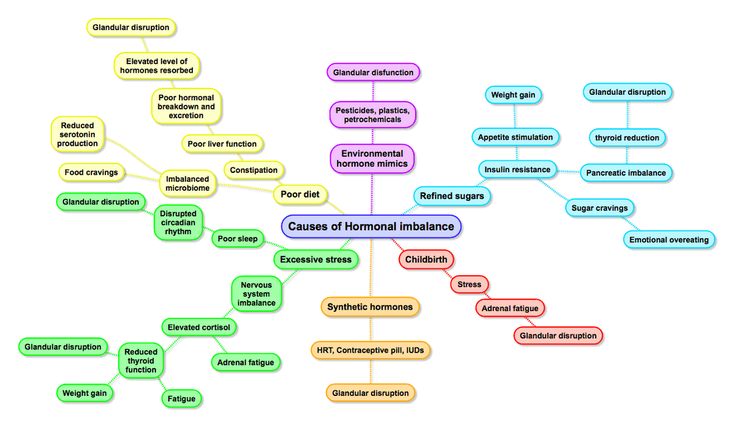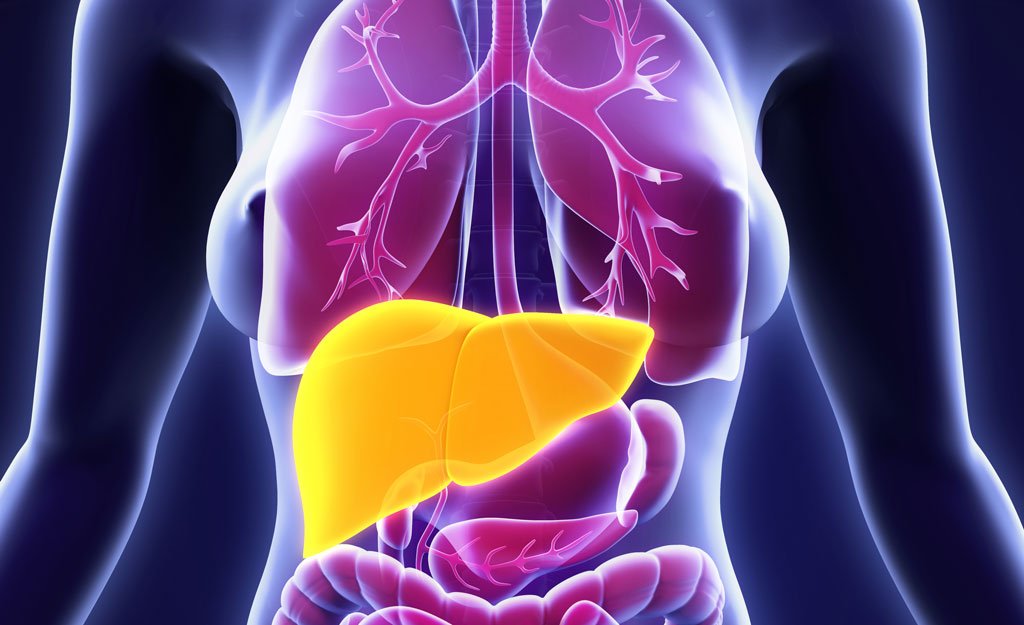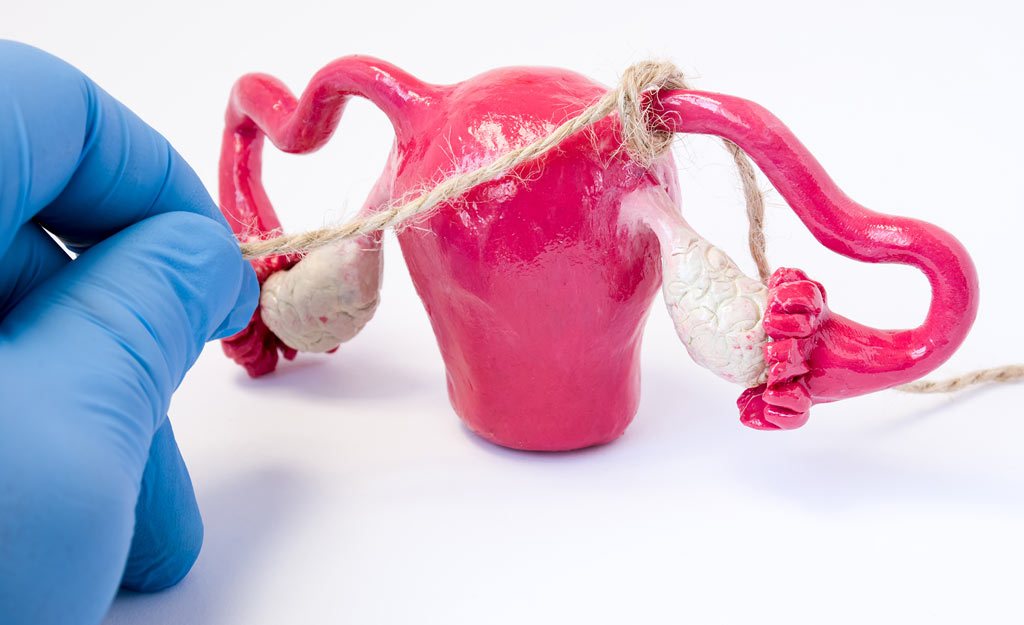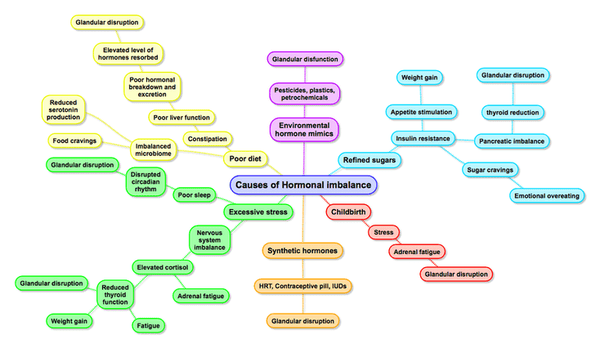What is Blocking You from Losing Weight?
Why does weight loss have to be so difficult?
The first thing to understand is that the basic mechanism of food in, exercise out, still applies. If you're eating too much of the wrong foods, and not moving your body enough, then you may as well stop reading this article now.
But if you are doing the right things, and still nothing is happening, then this article is for you.
Basically, you may be suffering from one or more BLOCKS that are stopping you from losing weight. Let's have a look at the main offenders briefly first, before exploring them in more detail:
- Thyroid and Adrenal function
- Hormonal imbalance and/or Hysterectomy
- Fat metabolism
- Digestive function and microflora balance
- Poor sugar metabolism or Insulin resistance
- Poor liver function leading to toxin accumulation
- Medical interventions
- Sleep
- Synthetic hormones
Thyroid & Adrenal Function
Thyroid deficiency, often triggered by Hashimoto's thyroiditis, is an epidemic these days in 40- to 60-year-old women. There are many causes, with gluten intolerance leading the list. But also prolonged stress, synthetic hormone use, nutrient deficiency, and hormonal imbalances being other main contributors.
Prolonged stress, in particular, is a common malady for modern-day women who need to work full time, run a house, manage children, and everything else that comes with our fast-paced society...
Stress is a natural mechanism designed for short periods; however long-term stress leads to adrenal exhaustion. When the adrenals are trying to cope with stress, the thyroid function is automatically reduced, to balance out the effects of adrenaline and cortisol.
Prolonged exposure to stress reduces thyroid function, which in turn leads to reduced metabolism and weight gain. Both thyroid and adrenal insufficiency then compound the issue, by causing chronic fatigue - making it difficult to exercise and move the body.
Depression and lack of motivation also go hand-in-hand with this, as part of thyroid and adrenal insufficiency.

If you already have thyroid issues and are taking medication, then consider more bio-available options, like thyroid extracts, as well as kelp & iodine to stimulate better thyroid function. Your thyroid levels may be balanced, but your body may be not utilising it effectively.
Hormonal Imbalance
Could your hormones be blocking weight loss?
Well, the simple answer is 'yes', your hormones are making you fat! Whether you're a teenager; or you suffer from PMS, PCOS, or endometriosis; or you're perimenopausal or suffer from menopause; it's important to understand why, and then how to minimise the impact of your hormones on your waist.
"Among several hormones, estrogens promote, maintain, and control the typical distribution of body fat and adipose tissue metabolism through still unknown mechanisms." PMID: 18473908
The first thing to understand is that one of the mechanisms of hormones - particularly oestrogen - is to increase weight.
It's a genetic and evolutionary quirk to enhance fertility - because fat cells assist during pregnancy to allow adequate nutrition in times of famine and scarcity.
Genetically, our metabolism is programmed for scarcity, and having to work hard to find our food. The simple process of finding and preparing food prevented us from getting fat, so evolution stepped in and assisted women.
This can be seen as a girl moves into puberty, and how she develops breasts and hips; men have traditionally seen women with 'childbearing' hips as attractive mates.
Fast-forward to the modern era, and women no longer need to work so hard for food. And as our diets have become removed from the way nature intended, weight gain and managing weight have become a constant battle for many modern women.
If you're wondering how to test whether or not you have a hormonal imbalance, we have a free hormone symptom profile assessment, which is very helpful in determining if your symptoms may be linked to a hormonal imbalance.
Environmental Mimics
Environmental toxins are at an all-time high. A lot of these toxins, from petrochemicals, pesticides, plastics & cleaning products act as hormone mimics.
They bind to hormone receptor sites - effectively creating an over-stimulation of hormone receptors. One particular receptor that gets activated, stimulates the hormones controlling weight gain. With millions of hormone receptors in the body, it's no surprise these toxic chemicals can have a serious effect on us.
Women are extremely sensitive to levels of environmental toxicity. The early development of young women in today's society is another sign that our children are being exposed to environmental mimics of sex hormone - not only during conception but during their development as well.
Reduced Capacity to Metabolise & Excrete Hormones
Hormones aren't easily broken down in the body and have to go through several processes in the liver via methylation and conjugation. This requires an effectively-functioning liver.
Women with chronic hormonal imbalances often have a genetic predisposition towards poor methylation & conjugation of hormones. And women with long-term exposure to high sugar levels is another common cause of liver disease.
When the liver doesn't metabolise our own internal hormones; and synthetic hormones are also prescribed - then these hormones recirculate, causing a 'double whammy'.
To make matters worse, if in conjunction with poor metabolism, the bowels aren't working properly, then hormones are reabsorbed back into the bloodstream, creating a 'triple whammy'.
This can happen due to poor bacterial balance, or because of constipation due to low-fibre diets from the over-processed food chain.
Healthy bacteria play an important role in the breakdown of hormones in the bowel, as well as the production of certain feel-good hormones, such as serotonin. If serotonin levels drop, then depression and emotional eating can develop.
Fat Metabolism
Women have twice the incidence of gallbladder issues compared to men. It's not well understood, but the mechanism is thought to be linked to oestrogen tightening the sphincter of Oddi in the gallbladder. When this happens, bile doesn't flow correctly, which creates gallstones and gallbladder malfunction.
The gallbladder's primary function is to metabolise dietary fats. Poorly metabolised fats can lead to weight gain. Interestingly, there are many studies linking the contraceptive pill to an increased risk of gallbladder disease.
Synthetic Hormones
Providing livestock with synthetic hormones is a well-known and previously wide-spread method to increase growth rates and fatten animals. It's also well known that synthetic hormones contribute to weight gain. But it's not as simple as the purely hormonal action.
There is the action on fat metabolism via the gallbladder as mentioned above, but also the disruption of the entire endocrine system.

Synthetic hormones signal the body to reduce its own supply of natural, healthy hormones. The false signalling, at the wrong times of the month, also further disrupts the balance of the endocrine system. The result of this is a sluggish metabolism with hard-to-move fat stores.
Pharmaceutical companies claim the Pill, HRT, Mirena, or Implanon do not increase weight - and of course, every woman is different. The biggest factor in the amount of weight comes from two sources: Firstly, is how well you metabolise the hormones. And secondly, the amount of fluid retained.
It's fairly common knowledge that synthetic hormones cause fluid retention, which is temporary; and subsides once you stop the hormones. However, the larger endocrine imbalance remains long after and requires intervention with natural medicines to correct the imbalance.
Blood Sugar & Insulin Resistance
Excessive exposure to refined sugars leads to imbalances in blood sugar levels and insulin resistance (i.e. it becomes more difficult to metabolise sugars). The sugar and carbohydrates are then stored as fat, rather than being used for energy consumption.
This is a very common phenomenon in women who suffer from Polycystic Ovarian Syndrome (PCOS), who find it extremely hard to lose weight, despite dieting and exercise. The insulin resistance needs to be corrected before the weight can shift.
For women without PCOS, insulin resistance from too much refined sugar will have the same impact, making it harder to lose weight.
Sleep

The circadian rhythm which controls the sleep cycle is intimately connected with the endocrine system. In fact, the hypothalamus controls the circadian rhythm - the same endocrine gland in the brain that is involved in hormone control.
The hypothalamus also controls appetite, among other things. Studies have shown that people who get less than 7 hours of sleep are more likely to be obese or overweight; have imbalanced blood sugar levels & insulin resistance; and more likely to have thyroid issues.
From clinical observation, women who do not sleep well, as well as shift workers, almost always have hormonal imbalances.
Our body is not made up of independent pieces. Everything is connected; and the sooner we understand this, better treatment options will develop for the range of diseases linked to endocrine imbalances - one of which are hormonal conditions.
Medical Interventions
Often surgeries are necessary, however, it doesn't change the fact that weight gain is often an unexpected side-effect of hysterectomies and tubal ligation - which is often not fully explained before undergoing the procedure.
In a study published in the Journal of Women's Health in 2009, they found that 36% of women gain 2.5 kilograms the year after a hysterectomy; and 23% gained 5 kilograms. (The same phenomena are also reported by vets following sterilisation of animals!)
The seemingly innocuous tubal ligation has also been linked to weight gain via a syndrome called Post Tubal Ligation Syndrome. The disruption of the endocrine system resulting from chemical mediators produced in the fallopian tubes leads to a wide range of conditions - one of which can be weight gain. Again, this doesn't occur in all women; however is interesting to note.
Digestive Capacity and Microflora Balance

An increasingly interesting area of research is the investigation of the human microbiome - the symbiotic relationship in our bodies with bacteria & foreign organisms.
The microbiota in the gut plays a major role in controlling appetite, metabolism and digestion of certain foods. The natural healthy state develops from birth, (actually, it begins during the birthing process - and children delivered by caesarean do not benefit from this bacterial exposure during birthing).
One study showed when mice were inoculated with bacteria from obese mice, they went on to develop obesity. It also worked in reverse - when obese mice were inoculated with bacteria from thin mice, they began to lose weight, independent of the diets they received.
Genetically modified foods have the same antibacterial influence on our gut ecology as antibiotics. And animals fed exclusively on GM foods, quickly show weight gain; development of allergies and systemic inflammation; and eventually premature death.
Toxin Accumulation
One of the functions of fat cells is to neutralise systemic toxins because fat is a safe medium to store toxins, like heavy metals and pesticides/herbicides.
In many cases, the body cannot excrete these toxins safely, so it prefers to store them in fat cells. The same goes for oestrogen - when you release these toxins, then the body will naturally reduce the volume of fat stored in these fat cells.
Sedentary Lifestyle

Move more and eat less - it can be this simple, but more often than not, it involves some of the above elements as well.
All these factors all play a role in weight gain. But one of the major causes of weight gain as women age is that they tend to become more sedentary as their children grow up, and our working environments are more often than not desk-based.
Sitting all day at a desk has been considered more dangerous to your health than smoking. We have a very quick and simple program of Plyometric Exercises which can be done every day to help boost metabolism.
A word on Diets
Fads come and go.
One of the most common fads is food group restriction - i.e low carb, low fat, high fat, low protein, etc. Restricting any one food group just doesn't make sense. And it's not sustainable.
What does make sense though, is to avoid any processed food from any of these food groups - i.e. avoid refined fats, processed grains and sugars, and commercially farmed meats.
Any foods which are removed from their natural state, or enhanced in terms of taste, texture or stimulated growth factors are not good for you.
The most sustainable and balanced diet is a plant-based, unrefined diet with small amounts of fish. Here is a full article on Dieting and different fad diets.

What can I do?
After reading all this information, it can be depressing because more likely than not, you've been affected by several of these health factors.
Don't worry though - we have a solution. The answer lies in re-creating the ideal environment your body needs to flourish.
Start with the right kinds of foods - which are fundamentally alkaline, high in antioxidants, and low in refined foods and sugars. In other words, follow our 8-Week Dietary Program!
As part of the program, we encourage a lot of fermented foods which up-regulate liver and digestive function.
We then suggest a combination of natural medicines to correct the endocrine system imbalance, which is at the core of the stubborn weight gain. If the endocrine system is imbalanced, then no matter how much exercise you do, or how healthy your diet is, the weight will not shift.
By correcting the Hypothalamic-Pituitary axis, which Happy Hormones does, then things start to move.
- Step 1: Follow our 8-Week Program
- Step 2: Complete our 28-Day Detox
- Step 3: Take Happy Hormones to deal with the hormonal issues
- Step 4: Take Liv'a Detox to encourage the healthy release of toxins and support hormone metabolism
- Step 5: Avoid synthetic hormones in any capacity. Whilst you're still taking synthetic hormones - whether it's HRT, bio-identical HRT, the Pill, a Mirena, an Implanon or Depo-Provera - you will always struggle to lose weight.
- Step 6: Take Kelp every day and apply liquid iodine to your skin twice a day to stimulate thyroid function. If you have insulin resistance, then take additional chromium and zinc.
It really can be that simple.
Balance
Avoid synthetic hormones; eat a balanced alkaline, high-antioxidant diet; exercise regularly; get enough sleep; manage stress; rebuild the gut & liver function, and the weight will shift. Be patient and it will be sustainable, once the blocks clear.
But all these elements need to be considered together - which is why we developed the comprehensive 8-Week Program and Happy Hormones supplements.
If you haven't already joined our private groups for hormonal balance and detoxification, then here are the links:
Would you like to receive our special Report on Weight Loss?
Click here for more details












